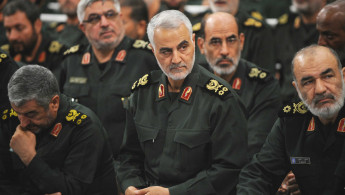EXCLUSIVE: Mass Iran spy leaks ‘accurate’, reveals Iraq official
The report, published in The Intercept, reveals the extent to which Iran has used spies, bribes and infiltrators in order to hold sway over the political direction of its neighbour, despite almost all of the Iraqi politicians and officials named in the cables have denied the findings.
Speaking on the phone to The New Arab’s Arabic-language service, an unnamed senior Baghdad official said the findings were "accurate and well-known in the political sphere" in Iraq.
They added that they believed the US had given the green light for the leak due to the deteriorating relations between Washington and Tehran in recent months.
"The documents show how Iran, at nearly every turn, has outmaneuvered the United States in the contest for influence," said the report published by the investigative outlet on Monday.
The official added that the Iraqi judiciary is not required to investigate charges of high treason resulting from the leaks, they inject "a new dose of anger and indignation" to the ongoing anti-government protests, much of which has been rebelling against Iranian influence over Iraqi domestic affairs.
The 700 pages of reports - written mainly in 2014 and 2015 by Iran's Ministry of Intelligence and Security - were sent to The Intercept and The New York Times anonymously by an Iraqi source.
Twitter Post
|
The whistleblower, who had declined to meet with a reporter in person, had said they wanted to "let the world know what Iran is doing in my country Iraq".
Abdel Mahdi's ‘special relationship’
The documents "offer a detailed portrait of just how aggressively Tehran has worked to embed itself into Iraqi affairs, and of the unique role of General (Qasem) Soleimani", wrote the outlets.
Soleimani, the head of the Iranian Revolutionary Guard Corps' elite Quds' Force, is the embodiment of Tehran's influence in Iraq, travelling there frequently during times of political turmoil.
Many of Iraq's most senior political, military, and security officials have entered into secret relationships with Tehran, according to the documents, including current Prime Minister Adel Abdel Mahdi and his predecessor Haider Abadi, as well as a host of former cabinet ministers.
Abdel Mahdi, who served as Iraq's oil minister in 2014, is described as having had a "special relationship" with Tehran.
A political advisor to former parliament speaker Salim Jabouri is alleged to have been an Iranian agent, present at meetings with a host of high-level US officials.
Another leak reveals how during the outbreak of the Syrian war in 2014, Bayan Jabr, the then transport minister, gave Iran permission to use Iraqi airspace to fly weapons and other supplies to support Bashar al-Assad and the Syrian regime, despite Washington’s obvious annoyance.
'All of the Iraqi Army's intelligence - consider it yours'
According to the New York Times, Tehran was able to gain much more access following the withdrawal of US troops from Iraq in 2011, which it said left Iraqi assets of the Central Intelligence Agency "jobless and destitute".
They then turned to Iran, offering information on the CIA's operations in Iraq in exchange for money, the report said.
In one incident, an Iraqi military intelligence officer had travelled from Baghdad to meet with an Iranian intelligence official in Iraq's holy city of Karbala.
During the three-hour meeting, the Iraqi official said his boss, Lieutenant General Hatem al-Maksusi, had told him to pass on the message to Iran that "all of the Iraqi Army's intelligence - consider it yours".
Al-Maksusi had also offered to give Iran information about a covert system established by the US to eavesdrop on Iraqi phones, run by the premier's office and military intelligence, the reports said.
The report has caused a outrage on social media, among Iranians and Iraqis alike. Both countries have witnessed anti-government protests due to political and economic corruption.
The Intercept have promised to reveal more details from the hundreds pages of docuements handed over to them.
Agencies contributed to this report.





 Follow the Middle East's top stories in English at The New Arab on Google News
Follow the Middle East's top stories in English at The New Arab on Google News
![Netanyahu furiously denounced the ICC [Getty]](/sites/default/files/styles/image_330x185/public/2024-11/GettyImages-2169352575.jpg?h=199d8c1f&itok=-vRiruf5)
![Both Hamas and the Palestinian Authority welcomed the ICC arrest warrants [Getty]](/sites/default/files/styles/image_330x185/public/2024-11/GettyImages-2178351173.jpg?h=199d8c1f&itok=TV858iVg)
